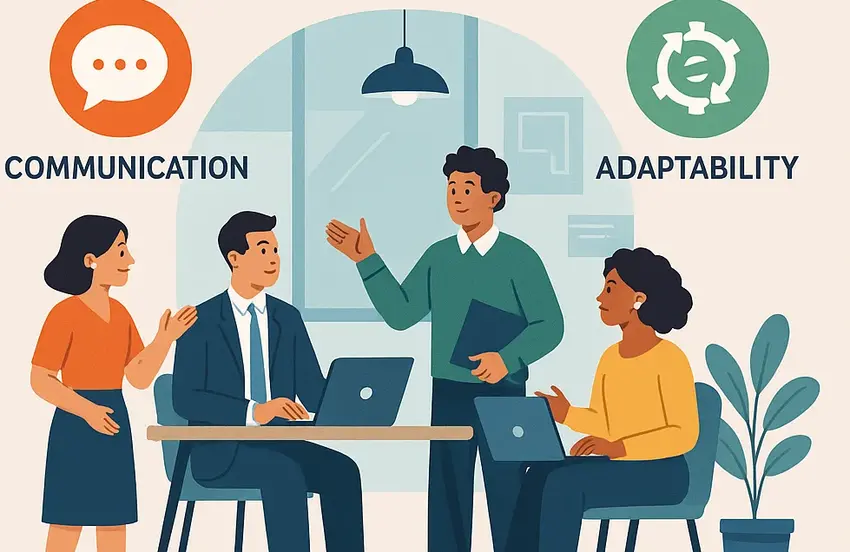1. The Age of Soft Power: Why These Skills Matter More Than Ever
Hard skills can get your foot in the door. But in 2025, soft skills are what unlock the next opportunity.
As AI tools automate technical tasks, companies are doubling down on what can’t be replicated by machines—human skills. Emotional intelligence, adaptability, critical thinking—these aren’t just résumé buzzwords. They’re career essentials. According to LinkedIn’s 2025 Workplace Trends Report, 89% of hiring failures stem from a lack of soft skills, not technical gaps.
Gartner and global employer surveys echo the same: In the post-AI era, the human element is your biggest advantage. Especially in hybrid environments, where remote tools dominate but human connection drives performance.
2. Why Soft Skills Matter More Than Ever
Let’s break it down:
- 89% of hiring failures are tied to soft skill shortcomings (LinkedIn)
- Hybrid work demands asynchronous communication and empathy
- Disruptive tech requires adaptive leaders, not just smart coders
- Global teams thrive only when cultural intelligence and collaboration are present
In essence, technical skills get outdated. Soft skills scale.
3. Top 10 Soft Skills Companies Want in 2025
Here are the top soft skills companies want in 2025, based on hiring data, employer interviews, and workforce trend analyses.
| Skill | Why It’s in Demand |
|---|---|
| 1. Adaptability | Needed to thrive amid rapid AI integration and organizational change |
| 2. Emotional Intelligence (EI) | Improves team cohesion, supports mental health, and reduces burnout |
| 3. Communication (incl. Public Speaking) | Crucial for remote teams, client interaction, and cross-department collaboration |
| 4. Critical Thinking | Enables informed decisions in a data-heavy, uncertain landscape |
| 5. Leadership | Essential to guide teams through ambiguity and inspire innovation |
| 6. Creativity & Innovation | Powers product development, brand differentiation, and marketing |
| 7. Customer Engagement | Humanizes tech-led services and improves retention |
| 8. Conflict Mitigation | Prevents disruption in increasingly diverse, global workplaces |
| 9. Stakeholder Management | Navigates complex, cross-functional projects with clarity |
| 10. AI Literacy | Understanding AI tools and collaborating with intelligent systems effectively |
4. Bonus: Rising Hybrid Skills to Watch
Beyond traditional soft skills, hybrid capabilities are emerging—blending technical understanding with human-centric execution.
- LLM Application: Knowing how to prompt and audit large language models (LLMs) effectively
- Data Interpretation + Communication: Not just reading dashboards but telling stories with data
- Digital Process Optimization: Understanding how to improve virtual workflows in async teams
These skills bridge the gap between technology fluency and human insight—a combination that employers are actively seeking in 2025.
📢 Looking to Hire Top Talent?
Reach thousands of active job seekers by posting your vacancy on WhatJobs. Whether you’re filling remote roles or in-office positions, we connect you to the right candidates—fast.
Post a Job Now5. How to Develop These Soft Skills
Soft skills aren’t born—they’re built.
Here are proven strategies to grow them:
- Online Certifications
Explore platforms like Coursera, LinkedIn Learning, and Google Career Certificates. Many offer practical modules on communication, leadership, and more. - Simulations and Feedback Loops
Role-playing, scenario-based learning, and real-time feedback sessions are ideal for building EI and communication. - Mentorship and Peer Coaching
Learning through observation and advice sharpens interpersonal awareness. - Real-World Projects
Freelance gigs, internships, and volunteer leadership roles provide applied learning that sticks.
6. Can You Train Soft Skills? Yes—With the Right Approach
Forget the myth: “You either have it or you don’t.”
Research-backed methods like behavioral learning, active listening workshops, and coaching sessions have proven successful in training soft skills. Many employers now invest heavily in soft skill development—because it pays dividends in productivity, morale, and retention.
7. Final Thoughts: Soft Skills = Career Insurance
In 2025 and beyond, technical knowledge is table stakes. What separates top talent from the rest is their ability to lead, adapt, and connect.
As industries change, soft skills remain constant. They are:
✅ AI-proof
✅ Transferable across careers
✅ Valued at every level of seniority
If you want to future-proof your career, invest in the top soft skills companies want in 2025—they’re your most reliable form of career insurance.
FAQ: Top Soft Skills Companies Want in 2025
1. What are the top soft skills companies want in 2025?
The most in-demand soft skills in 2025 include:
1. Adaptability
2. Emotional Intelligence (EI)
3. Communication (including public speaking)
4. Critical Thinking
5. Leadership
6. Creativity and Innovation
7. Customer Engagement
8. Conflict Mitigation
9. Stakeholder Management
10. AI Literacy
These skills are crucial for thriving in fast-paced, tech-driven, and collaborative work environments.
2. Why are soft skills more important in 2025?
As AI and automation take over technical tasks, companies are prioritizing soft skills that machines can’t replicate—like empathy, communication, and leadership. These are essential for managing change, collaborating across teams, and maintaining workplace culture in hybrid setups.
3. Can soft skills be trained?
Yes. Soft skills can be developed through intentional practice, feedback, coaching, and role-play. Online platforms like Coursera, LinkedIn Learning, and mentorship programs also provide structured ways to improve communication, leadership, and emotional intelligence.
4. How do companies assess soft skills during hiring?
Employers use a mix of methods, including:
1. Behavioral interview questions
2. Job simulations or role-playing exercises
3. Personality assessments
4. Peer and manager references
These techniques help gauge a candidate’s real-world interpersonal and problem-solving abilities.
5. Which soft skills are considered “AI-proof”?
Skills like emotional intelligence, creativity, ethical judgment, and leadership are AI-proof because they rely on human emotion, context, and empathy—qualities that AI can’t fully replicate.




